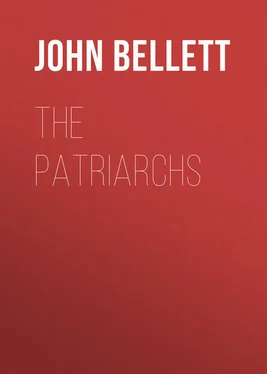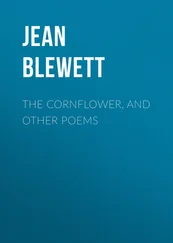John Bellett - The Patriarchs
Здесь есть возможность читать онлайн «John Bellett - The Patriarchs» — ознакомительный отрывок электронной книги совершенно бесплатно, а после прочтения отрывка купить полную версию. В некоторых случаях можно слушать аудио, скачать через торрент в формате fb2 и присутствует краткое содержание. Жанр: foreign_antique, foreign_prose, Биографии и Мемуары, на английском языке. Описание произведения, (предисловие) а так же отзывы посетителей доступны на портале библиотеки ЛибКат.
- Название:The Patriarchs
- Автор:
- Жанр:
- Год:неизвестен
- ISBN:нет данных
- Рейтинг книги:4 / 5. Голосов: 1
-
Избранное:Добавить в избранное
- Отзывы:
-
Ваша оценка:
- 80
- 1
- 2
- 3
- 4
- 5
The Patriarchs: краткое содержание, описание и аннотация
Предлагаем к чтению аннотацию, описание, краткое содержание или предисловие (зависит от того, что написал сам автор книги «The Patriarchs»). Если вы не нашли необходимую информацию о книге — напишите в комментариях, мы постараемся отыскать её.
The Patriarchs — читать онлайн ознакомительный отрывок
Ниже представлен текст книги, разбитый по страницам. Система сохранения места последней прочитанной страницы, позволяет с удобством читать онлайн бесплатно книгу «The Patriarchs», без необходимости каждый раз заново искать на чём Вы остановились. Поставьте закладку, и сможете в любой момент перейти на страницу, на которой закончили чтение.
Интервал:
Закладка:
"And Noah began to be an husbandman, and he planted a vineyard, and drank of the vine, and was drunken, and he was uncovered within the tent."
Noah himself is put to shame; the very first man, the Adam of this new system, begins the history of this second apostasy, like his first father.
The "little fire" is thus kindled; but it is for "a greater matter." Noah is put to shame; but Ham, his son, glories in the shame. That was a terrible advance in the progress of evil. "Ham, the father of Canaan, saw the nakedness of his father, and told his two brethren without."
It was a terrible advance in evil; this was not simply the being "overtaken in a fault," but "rejoicing in iniquity." The common moral sense rejects this-"Shem and Japheth took a garment, laid it on their shoulders, went backwards, and covered the nakedness of their father." And the saint himself is soon restored. Noah awakens from his wine. He that was overtaken recovers himself, through the Spirit, and the grace of God gives him a great triumph-a very precious and glorious triumph indeed, for the restored one judges his judge, and condemns his accuser-"Cursed be Canaan, a servant of servants shall he be unto his brethren." This is something more than recovery-it is triumphant recovery. Even the apostle's fine word, "Who shall lay anything to the charge of God's elect?" scarcely measures it; for that is only the silencing of the accuser, while this is turning back on the pursuer. "Rejoice not against me, O mine enemy: when I fall, I shall rise… Then she that is mine enemy shall be trodden down as the mire of the streets."
Here, however, we may stand for a moment-the rich and interesting prospects of the Spirit of prophecy here spread themselves out before us.
This curse upon Canaan is part of Noah's prophecy. Noah, in spirit, looked out from the renewed earth, but anticipated the return of corruption and violence, though the grace of God were to have its witness in the midst of it. In detail, he saw that one branch of the human family (now about to re-people the earth) was to be distinguished by the revelation and presence of God among them; another by their success and advancement in the world-a people to be enlarged and made honourable in the earth; another, by the constant, unchanging token, in their flesh, of degradation and servitude. His prophecy contemplated, as we may say, the Asiatic, the European, and the African man; or, the Hebrew in the East, with whom was to be the sanctuary of God-the Gentile of the West, who was, under the hand or providence of God, to make himself great in borders beyond his own-and the slave of the South, who might know a change of masters, but who was to be a slave still.
Short is the notice of the world's history, but just and perfect as far as it goes, and enough to answer the purpose of the Spirit in Noah, who was taking his son Ham for his text.
The three prophecies, which we get in these earliest times, that of Enoch, that of Lamech, and this of Noah, all touching the earth and its history, though respecting different stages or parts of that history, together present a very perfect outline of the whole thing. We must take them in this order-Noah's, Enoch's, Lamech's.
Noah's prophecy has been accomplishing from of old, and is still getting its seal and witness in all the changes of the world's solemn and interesting story. Enoch's (Jude 14), which spoke of judgment, will have its answer, its full answer, when the present course of things is closing, and the day of the Lord comes to convince the ungodly. Lamech's (Genesis v. 29), which spoke of rest, will be made good afterwards, when, "the day of the Lord" having fulfilled the judgment, "the presence of the Lord" will bring its restitution and refreshing.
The present and the future of the world's history, the varied good and evil of the present, and the judgment and the glory that are to share the future, are thus sketched before us in these prophecies. It is easy to discern these things, and to give these early patriarchal oracles their order and character.
It is Noah's, however, that I must look at more particularly, as what we have more properly to do with here. It was delivered on the discovery of the evil of his son Ham, and the onward course of evil is then detailed to its close and maturity, ere we leave these chapters.
We have already watched the infant springing of it in Noah himself, and the advanced form of it in Ham. Its further growth is next to be seen in the builders of Babel, some hundred years after the flood. And an awful exhibition it is.
At the birth-time of this new world, Noah's altar was raised, witnessing faith and worship-but now the city and the tower are reared, witnessing defiance of God and the affected independency of man. And the answer of heaven to these things is just as different. Noah's altar brought down words and tokens of peace and security-the cry of the city and the tower now bring down judgment. Corruption here, and vengeance from on high, mark the scene, instead of worship here, and blessing from God. Then it was, that the Lord hung the bright token of His covenant in the heavens, but now He is sending abroad over the earth the witnesses of His righteous anger.
But this is not all. The tower is over-topped, high and proud as it was. The builders may be scattered, but their principles survive. Judgment does not cure. All the apostate mind that quickened that proud and rebellious confederacy, gathers itself rapidly for its perfect work and display in one man. For soon after the scattering (it may be about thirty years) Nimrod, a grandson of Ham, plants his standard on the very spot which had witnessed the judgment of God. The beginning of his kingdom was Babel. x. 10. He unfurls his banner in the very face of Him "to whom vengeance belongs," and cries, "Where is the God of judgment?" He was as the fool of Ps. xiv. – "The fool hath said in his heart, There is no God." He begins to be a mighty one in the earth. "Before the Lord he hunted." In defiance of God he sought conquest and power. He added house to house and field to field, in the desire to be lord alone. Erech and Accad and Calneh are mother-cities, and mighty Nineveh with Rehoboth and Calah, and that great city Resen, are but colonies in the system of this vaunting apostate. He had no heart for any portion which God could give him. He undertook to provide for himself, to be the maker of his own fortune, that his dignity and honour should proceed from himself. And such an one is the man of the world to this day. His intellect or his industry, his skill or his courage, makes him what he is, and provides him what he cares for. Such was this distinguished apostate, this earliest representative and type of that one who, in closing days, is to do according to his will, and fill the measure of man's iniquity.
It is a serious sight for the watching and observance of our souls. Are we, beloved, waiting for other and purer scenes? and are our hearts upon such enjoyments as God can sanction, and Jesus share with us?
These chapters properly close with this-these scenes of evil and proud rebellion pass from before us, with a faint and distant view of the call of another heavenly stranger apart from the world. But all that is the dawn of another era in the ways of God, and our present subject only looks at it in the distance.
The second part of the book of Genesis, I may say, ends here. It presents a complete, distinct action, suitably following what had preceded it, and as suitably (were it my purpose to show it) introducing what is to follow it.
In this portion, Gen. vi. – xi., the scene is laid in the earth. The heavenly family have already been before us, Gen. i. – v., and their course ended in the translation of Enoch; now the scene is laid in the earth again, as at the beginning in the garden of Eden.
Читать дальшеИнтервал:
Закладка:
Похожие книги на «The Patriarchs»
Представляем Вашему вниманию похожие книги на «The Patriarchs» списком для выбора. Мы отобрали схожую по названию и смыслу литературу в надежде предоставить читателям больше вариантов отыскать новые, интересные, ещё непрочитанные произведения.
Обсуждение, отзывы о книге «The Patriarchs» и просто собственные мнения читателей. Оставьте ваши комментарии, напишите, что Вы думаете о произведении, его смысле или главных героях. Укажите что конкретно понравилось, а что нет, и почему Вы так считаете.












